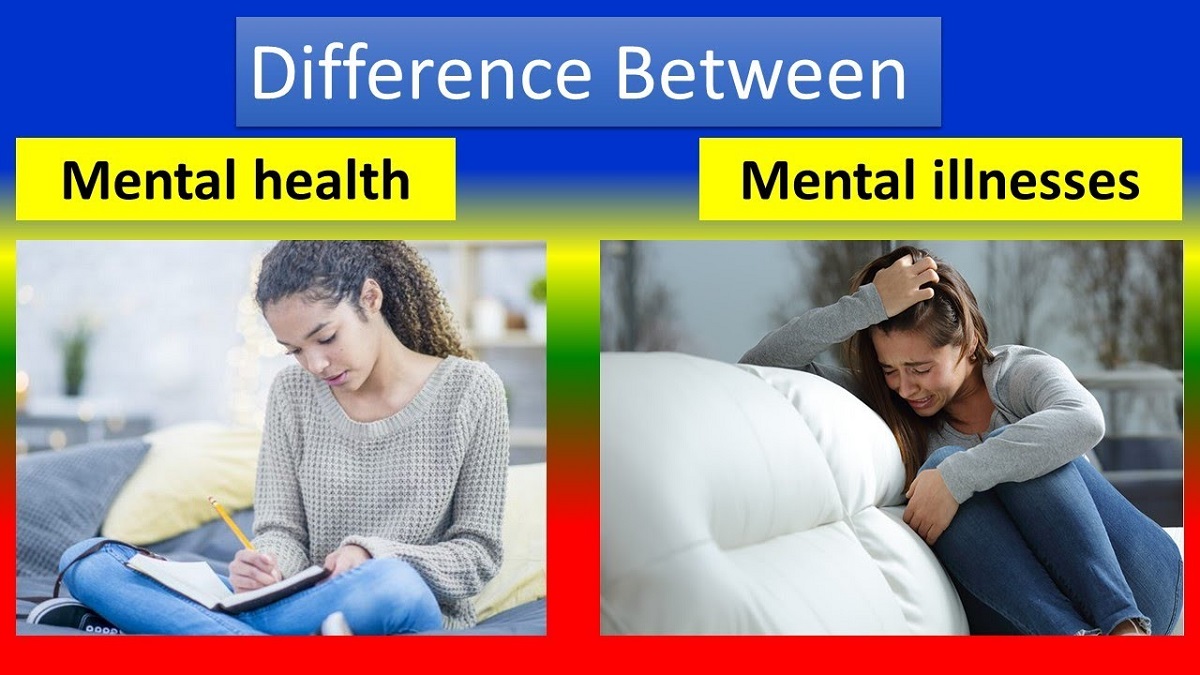Although the terms “mental illness” and “mental health” are frequently used interchangeably, they have different meanings. Mental illness is a medical term for a condition that affects one’s thoughts and behaviours, whereas mental health refers to anyone’s state of mental and emotional well-being. Even though everyone occasionally experiences mental health issues, not everyone has a mental illness. A person with a mental disorder, however, can regain excellent mental health.
What Is Mental Wellness?
Mental well-being is the foundation of mental health. The World Health Organisation (WHO) asserts that a person with good mental health can reach their full potential, manage everyday stress, and make a positive contribution to their community. Physical, mental, and social well-being are all aspects of mental health. A person with good mental health can face daily hardships and still lead a full life.
Whether a person has a mental illness or not, factors like traumatic experiences can have an impact on mental health. Things like exclusion, discrimination, and poor physical health can all have an effect on someone’s mental health. The following strategies can be used to advance mental health in a community:
establishing surroundings that are secure, caring, and guarded for children
empowering and elevating disadvantaged or marginalised groups
strengthening communities
providing therapy, medicine, and other forms of treatment for mental diseases.
Making healthy lifestyle changes and seeking a sense of purpose in life might help a person’s mental health. Throughout their lifetime, a person’s mental health might change depending on environmental variables. An individual can have good mental health despite having a mental disorder. Anyone can improve their mental health with the right assistance.
Read More: Importance Of Mental Health In Teenagers – About Pakistan
Mental Illness: What Is It? Mental Disorders versus Mental Health Issues
A diagnosable disorder with a set of accepted criteria is mental illness. Genes, brain chemistry, or traumatic experiences are a few of the possible causes. Mental illness can affect everyone, regardless of age, social status, sex, or ethnicity. These problems can also be referred to as mental health issues.
Mental diseases make it more difficult to maintain mental health because they alter how a person feels, thinks, acts, or perceives the world. The symptoms of many mental diseases vary, some of which require effort to overcome. The most prevalent symptoms of some of the most widespread mental diseases are listed below.
Depression
There are various kinds of major depressive illness and clinical depression. It has an impact on how someone feels, thinks, or behaves. Depression is a persistent condition that involves symptoms such persistently poor moods, difficulties concentrating, anxiety, tiredness, and social withdrawal. Everybody has a different set of symptoms. Hallucinations or delusions may also accompany psychotic depression. Those who suffer from depression can lead full, rewarding lives with assistance and, perhaps, medication.
Anxiety
While occasionally feeling anxious is normal for everyone, those with anxiety disorders worry excessively and persistently. Symptoms can include agitation, exhaustion, difficulty concentrating, impatience, tension in the muscles, and sleep issues. Anxiety disorders include phobias and panic disorders. Disorders of anxiety are fairly prevalent. An anxiety problem affects 31% of adults at some point in their lives. Talk therapy, medication, relaxation exercises, and exercise are all effective therapies.
Disorder of the mind
Bipolar disorder causes drastic changes in energy, mood, and focus. An individual with bipolar disorder could experience periods of intense energy and joy followed by apathy. Manic and depressed episodes are the terms used to describe these severe mood fluctuations. A significant impact can be made with the right diagnosis and care. The two main treatments for bipolar disorder are talk therapy and medication. Exercise and mood monitoring are also beneficial.
Disorder of compulsive behaviour (OCD)
OCD is a mental illness that results in recurrent, unwanted thoughts or ideas. These ideas may result in compulsive behaviours that are recurrent and disruptive to daily living. An extreme dread of germs, an obsession with symmetry or precision, a worry about losing things, or intrusive thoughts are examples of obsessions. Compulsions include compulsive cleaning, arranging of objects, checking of locks, and approval seeking.
OCD’s effects can be mitigated with both talk therapy and medication. Exposure and response prevention are part of one therapeutic approach. OCD sufferers may in rare situations need partial hospitalisation or inpatient care. Many people with OCD lead happy, useful lives.
The Distinction Between Mental Illness and Mental Health
In essence, there is a difference between mental wellness and mental sickness. Although only certain people have officially diagnosed mental diseases, everyone’s mental health is affected. Realising that poor mental health is not always caused by mental disease as well as that mental illness is not always the cause of poor mental health is beneficial. Whether or not a mental disease is present, life events or other external influences can have an impact on anyone’s mental health.
Elements of Mental Health
Whether or whether they have a mental disease, everyone wishing to enhance their mental health can do a few things. Positive mental health can be maintained by a variety of external sources. Try some of these strategies if you’re seeking for ways to improve your mental health:
Get moving: Exercise is good for your physical and mental health. Your mental health, sense of self, and cognitive abilities may all be enhanced. It promotes restful sleep, reduces stress, and sharpens your mind. Improvements can be attained with as little as 30 minutes of brisk walking three times per week.
Eating correctly can improve your ability to think effectively and make you feel more alert. It results in improved decision-making abilities, quicker reaction times, and less weariness. Increase your consumption of fruits, vegetables, whole grains, and seafood. Limit your intake of dairy, meat, and processed meals. Read about how diet affects mental health.
Read More: Students mental health issues and suicide risk – About Pakistan
Practise relaxation techniques if you need to regulate your stress levels. Deep breathing, yoga, and meditation can make you feel more at ease and help you respond better to stressful situations.
Be sociable: People are inherently sociable. Your mental health can be improved by socialising. Make an effort to interact with others and hang out with positive people. Considering joining a social group for those with isolated jobs
Seek counselling: The best way to enhance anyone’s mental health is to seek professional counselling. To benefit from counselling services, you don’t necessarily need to have a documented mental disorder. A qualified counsellor will assist you in discussing your worries and will provide advice on ways to support sound mental health.
Bottom Line
Although they are related, mental health and mental illness are not the same. In contrast, a person might have poor mental health even if they do not have a documented mental illness. A person can also have good mental health while coping with a mental illness. In order to prevent mental disease and promote general wellbeing, it is crucial to prioritise and maintain excellent mental health.





















